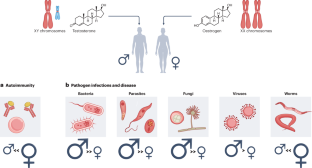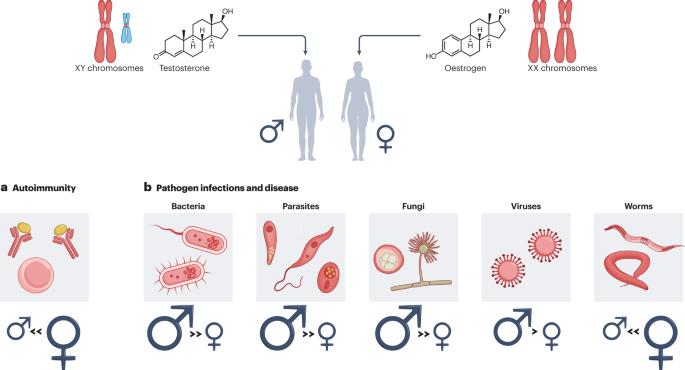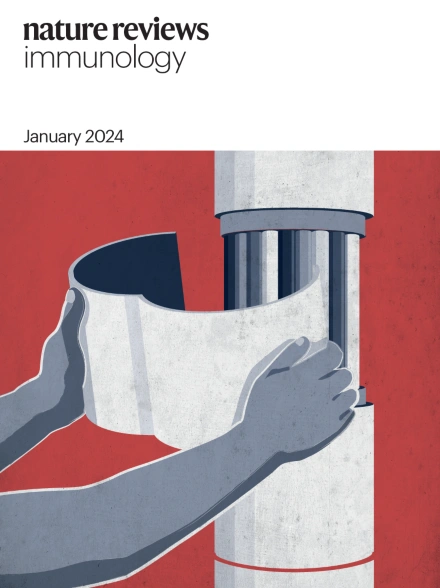The conneXion between sex and immune responses
IF 67.7
1区 医学
Q1 IMMUNOLOGY
引用次数: 0
Abstract
There are notable sex-based differences in immune responses to pathogens and self-antigens, with female individuals exhibiting increased susceptibility to various autoimmune diseases, and male individuals displaying preferential susceptibility to some viral, bacterial, parasitic and fungal infections. Although sex hormones clearly contribute to sex differences in immune cell composition and function, the presence of two X chromosomes in female individuals suggests that differential gene expression of numerous X chromosome-linked immune-related genes may also influence sex-biased innate and adaptive immune cell function in health and disease. Here, we review the sex differences in immune system composition and function, examining how hormones and genetics influence the immune system. We focus on the genetic and epigenetic contributions responsible for altered X chromosome-linked gene expression, and how this impacts sex-biased immune responses in the context of pathogen infection and systemic autoimmunity. Immune responses to pathogens and self-antigens show sex-based differences, with female individuals generally more susceptible to autoimmunity and male individuals more vulnerable to infections. In this Review, the authors explore the role of hormones and genetics in shaping immune responses, and discuss genetic and epigenetic contributions to altered X-linked gene expression that affect immune responses.


性别与免疫反应之间的关系
对病原体和自身抗原的免疫反应存在明显的性别差异,女性对各种自身免疫性疾病的易感性增加,而男性对某些病毒、细菌、寄生虫和真菌感染的易感性较高。虽然性激素明显导致了免疫细胞组成和功能的性别差异,但女性个体中存在两条 X 染色体,这表明与 X 染色体相关的大量免疫相关基因的不同基因表达也可能影响健康和疾病中先天性和适应性免疫细胞功能的性别差异。在此,我们回顾了免疫系统组成和功能的性别差异,探讨了激素和遗传是如何影响免疫系统的。我们重点研究了导致 X 染色体相关基因表达改变的遗传学和表观遗传学因素,以及这在病原体感染和系统性自身免疫的情况下如何影响性别免疫反应。
本文章由计算机程序翻译,如有差异,请以英文原文为准。
求助全文
约1分钟内获得全文
求助全文
来源期刊

Nature Reviews Immunology
医学-免疫学
CiteScore
93.40
自引率
0.40%
发文量
131
审稿时长
6-12 weeks
期刊介绍:
Nature Reviews Immunology is a journal that provides comprehensive coverage of all areas of immunology, including fundamental mechanisms and applied aspects. It has two international standard serial numbers (ISSN): 1474-1733 for print and 1474-1741 for online. In addition to review articles, the journal also features recent developments and new primary papers in the field, as well as reflections on influential people, papers, and events in the development of immunology. The subjects covered by Nature Reviews Immunology include allergy and asthma, autoimmunity, antigen processing and presentation, apoptosis and cell death, chemokines and chemokine receptors, cytokines and cytokine receptors, development and function of cells of the immune system, haematopoiesis, infection and immunity, immunotherapy, innate immunity, mucosal immunology and the microbiota, regulation of the immune response, signalling in the immune system, transplantation, tumour immunology and immunotherapy, and vaccine development.
文献相关原料
| 公司名称 | 产品信息 | 采购帮参考价格 |
|---|
 求助内容:
求助内容: 应助结果提醒方式:
应助结果提醒方式:


